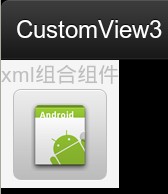android自定义控件(五) 自定义组合控件
转自http://www.cnblogs.com/hdjjun/archive/2011/10/12/2209467.html 代码为自己编写
目标:实现textview和ImageButton组合,可以通过Xml设置自定义控件的属性。
通过代码或者通过xml设置自定义控件的属性
1.控件布局:以Linearlayout为根布局,一个TextView,一个ImageButton。
Xml代码
- < ?xml version="1.0" encoding="utf-8"?>
- < LinearLayout xmlns:Android="http://schemas.android.com/apk/res/android"
- android:layout_width="fill_parent" android:layout_height="fill_parent"
- android:gravity="center_vertical">
- < TextView android:layout_height="wrap_content" android:id="@+id/text1"
- android:layout_width="wrap_content">< /TextView>
- < ImageButton android:layout_width="wrap_content"
- android:layout_height="wrap_content" android:id="@+id/btn1">< /ImageButton>
- < /LinearLayout>
Java代码
- public class ImageBtnWithText extends LinearLayout {
- }
- public ImageBtnWithText(Context context) {
- this(context, null);
- }
- public ImageBtnWithText(Context context, AttributeSet attrs) {
- super(context, attrs);
- //在构造函数中将Xml中定义的布局解析出来。
- LayoutInflater.from(context).inflate(R.layout.imagebtn_with_text, this, true);
- }
- }
3.在主界面布局xml中使用自定义控件:
Xml代码
- < com.demo.widget2.ImageBtnWithText
- android:id="@+id/widget"
- android:layout_width="fill_parent"
- android:layout_height="fill_parent" />
运行可以看到控件已经能够被加载到界面上。
4.给按钮设置图片和文本
如果图片是固定不变的,那么直接在控件布局中设置ImageButton的src属性即可。
4.1通过Java代码设置,在控件代码中提供函数接口:
Java代码
- public void setButtonImageResource(int resId) {
- mBtn.setImageResource(resId);
- }
- public void setTextViewText(String text) {
- mTv.setText(text);
- }
4.2通过Xml设置属性
4.2.1首先定义Xml可以设置的属性集合,在values下创建attrs.xml,文件名可随意,一般都叫attrs.xml
Xml代码
- < ?xml version="1.0" encoding="utf-8"?>
- < resources>
- < declare-styleable name="ImageBtnWithText">
- < attr name="android:text"/>
- < attr name="android:src"/>
- < /declare-styleable>
- < /resources>
集合中包含的属性列表,每行一个属性。
4.2.2修改自定义控件实现代码,以获取xml中定义的属性
Java代码
- TypedArray a = context.obtainStyledAttributes(attrs, R.styleable.ImageBtnWithText);
- CharSequence text = a.getText(R.styleable.ImageBtnWithText_android_text);
- if(text != null) mTv.setText(text);
- Drawable drawable = a.getDrawable(R.styleable.ImageBtnWithText_android_src);
- if(drawable != null) mBtn.setImageDrawable(drawable);
- a.recycle();
然后通过TypedArray类的getXXXX()系列接口获得相应的值。
4.2.3在主界面布局中设置自定义控件的属
android:text="ABC" android:src="@drawable/icon
4.3自定义名称属性:
在4.2中使用的属性名是Android系统命名空间的,都以android开头,比如android:text等。
实际开发中会自定义一些属性名,这些属性名仍然定义在4.2.1提到的attrs.xml中:
4.3.1定义属性名
Xml代码
- < attr name="appendText" format="string"/>
4.3.2使用自定义属性
Xml代码
- < ?xml version="1.0" encoding="utf-8"?>
- < LinearLayout xmlns:android="http://schemas.android.com/apk/res/android"
- xmlns:myspace="http://schemas.android.com/apk/res/com.demo.customwidget"
- android:orientation="vertical" android:layout_width="fill_parent"
- android:layout_height="fill_parent">
- < com.demo.widget2.ImageBtnWithText
- android:text="ABC" android:src="@drawable/icon" android:id="@+id/widget"
- android:layout_width="fill_parent" android:layout_gravity="center"
- android:layout_height="fill_parent" myspace:appendText="123456">
- < /com.demo.widget2.ImageBtnWithText>
- < /LinearLayout>






